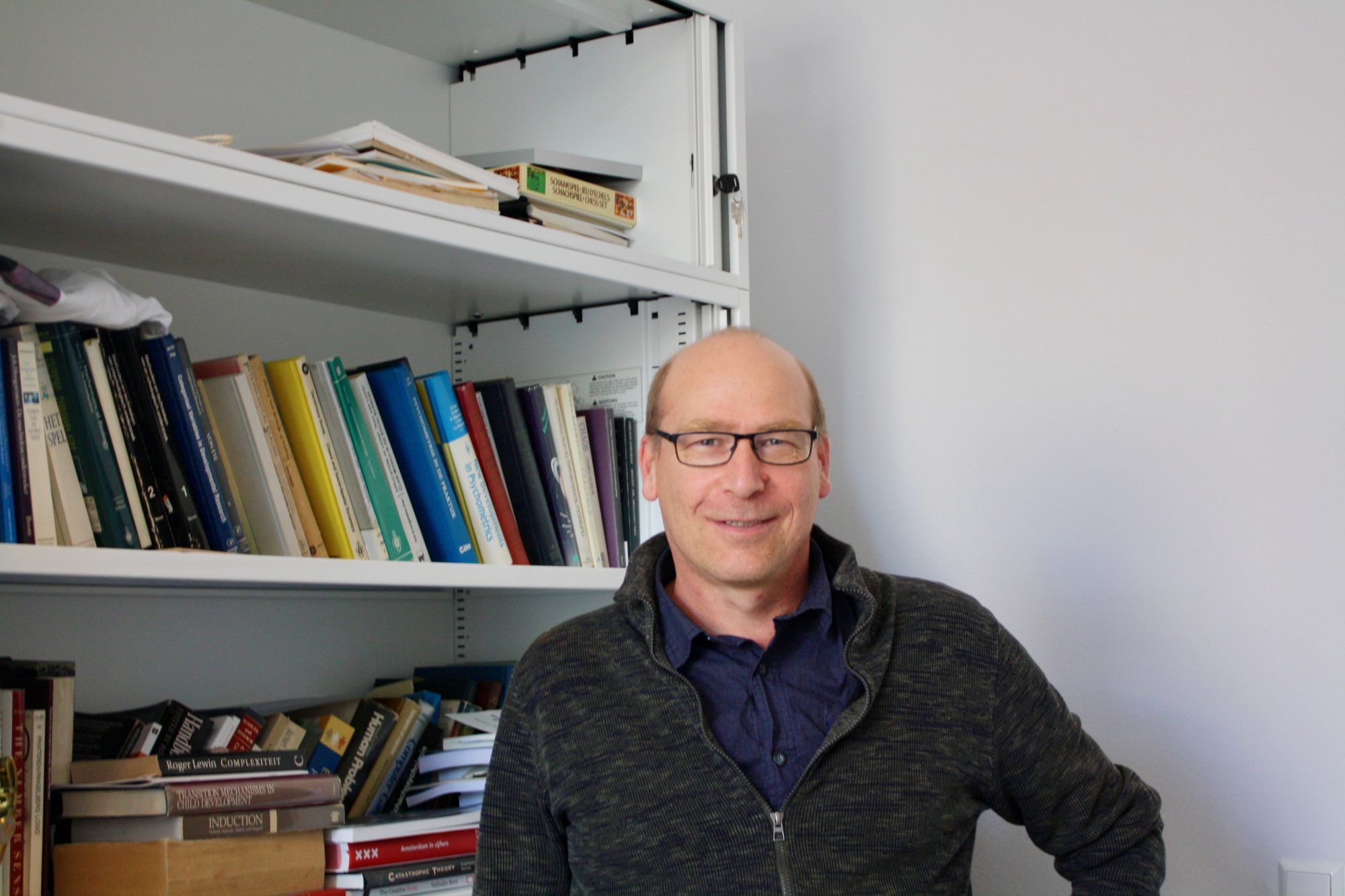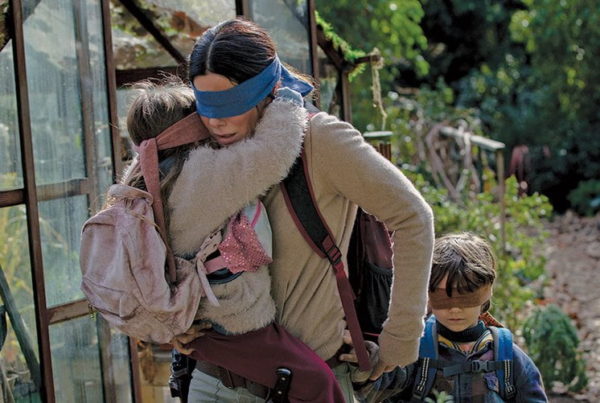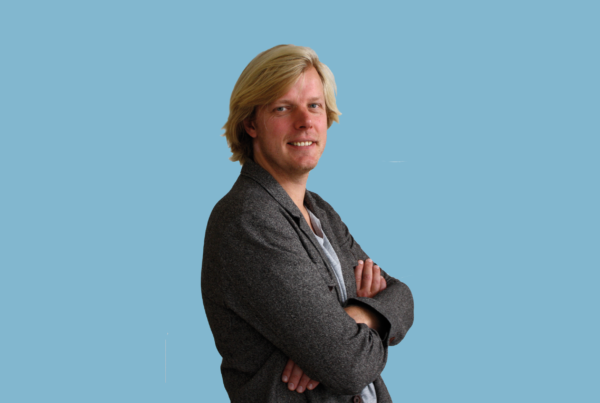
Han van der Maas has been part of the UvA ─ both as a student and a professor ─ for more than three decades. In September 2019, he was appointed as a distinguished research professor of Complex Systems in Social and Behavioural Sciences. Spiegeloog congratulates him on his new appointment and asked him a few questions.
Han van der Maas has been part of the UvA ─ both as a student and a professor ─ for more than three decades. In September 2019, he was appointed as a distinguished research professor of Complex Systems in Social and Behavioural Sciences. Spiegeloog congratulates him on his new appointment and asked him a few questions.

What exactly makes up the role of a distinguished research professor?
‘My role is to build collaborations across the many departments of the Social and Behavioural Faculty ranging from Psychology to Political Science. I am looking for common themes within these departments and strive to create new research areas. I also focus on strengthening the collaborations between the Social and Behavioural faculty and the Institute of Advanced Study (IAS) of which I am an associate and founder. My own research focuses on the topic of complexity which is also an important topic within the IAS. I would like to build bridges between the IAS and the faculty of Social and Behavioural Sciences by working together on the topic of complexity.’
How do you become a distinguished research professor?
‘The faculty of Social and Behavioural Science and its dean Agneta Fischer decided to appoint four people in the role of a distinguished research professor to create new collaborations within the faculty. This is why I have been appointed.’
What are the topics of your current research?
‘I am currently working on several topics. In modern science collaborating with other researchers is essential. I am involved in roughly twenty research projects either as an adviser or main author. The topics range from addiction to cognitive development but the central project I am working on right now focuses on the polarisation and radicalisation of attitudes. With this new professorship role, I will focus more on how polarisation of opinions works and how we can cope with polarisation and radicalisation. We, researchers from the Social Psychology and the Methods department, are focused on new computational models that can explain this phenomenon. We strive to incorporate the methodological and mathematical components of complexity in our research on polarisation. Complex systems consist of multiple parts that have nonlinear interactions between each other. These interactions play a role in structures like the brain but also in social systems. With complex system modelling we intend to predict as well as control their behaviours. The overall goal of my scientific career is to see what can be done with these models and methods developed in the natural sciences and apply them in fields like Psychology.’
How did your academic career look like before working at the UvA?
‘I am not a job-hopper, which I would actually recommend, and stayed at the UvA throughout my entire scientific career. After finishing my Master’s in Psychological Methods in 1989, I took a detour by doing my PhD in Developmental Psychology. In 1998, I started to work as an associate professor at the UvA and became a full professor in 2003 working on Psychological Methods. You could say I came back to my roots. I was here as a student and sometimes I still feel like one even though I am now the director of research of the psychology department.’
What exactly makes up the role of a distinguished research professor?
‘My role is to build collaborations across the many departments of the Social and Behavioural Faculty ranging from Psychology to Political Science. I am looking for common themes within these departments and strive to create new research areas. I also focus on strengthening the collaborations between the Social and Behavioural faculty and the Institute of Advanced Study (IAS) of which I am an associate and founder. My own research focuses on the topic of complexity which is also an important topic within the IAS. I would like to build bridges between the IAS and the faculty of Social and Behavioural Sciences by working together on the topic of complexity.’
How do you become a distinguished research professor?
‘The faculty of Social and Behavioural Science and its dean Agneta Fischer decided to appoint four people in the role of a distinguished research professor to create new collaborations within the faculty. This is why I have been appointed.’
What are the topics of your current research?
‘I am currently working on several topics. In modern science collaborating with other researchers is essential. I am involved in roughly twenty research projects either as an adviser or main author. The topics range from addiction to cognitive development but the central project I am working on right now focuses on the polarisation and radicalisation of attitudes. With this new professorship role, I will focus more on how polarisation of opinions works and how we can cope with polarisation and radicalisation. We, researchers from the Social Psychology and the Methods department, are focused on new computational models that can explain this phenomenon. We strive to incorporate the methodological and mathematical components of complexity in our research on polarisation. Complex systems consist of multiple parts that have nonlinear interactions between each other. These interactions play a role in structures like the brain but also in social systems. With complex system modelling we intend to predict as well as control their behaviours. The overall goal of my scientific career is to see what can be done with these models and methods developed in the natural sciences and apply them in fields like Psychology.’
How did your academic career look like before working at the UvA?
‘I am not a job-hopper, which I would actually recommend, and stayed at the UvA throughout my entire scientific career. After finishing my Master’s in Psychological Methods in 1989, I took a detour by doing my PhD in Developmental Psychology. In 1998, I started to work as an associate professor at the UvA and became a full professor in 2003 working on Psychological Methods. You could say I came back to my roots. I was here as a student and sometimes I still feel like one even though I am now the director of research of the psychology department.’



